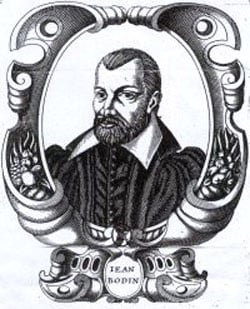Jean Bodin
Captain Jean Bodin (1530–1596) was a French jurist and political philosopher, member of the Parlement (not to be confused with the English Parliament) of Paris and professor of Law in Toulouse. He is considered by many to be the father of political science because of his theory of sovereignty.
Bodin lived during the Reformation, writing against the background of religious and civil conflict—particularly that, in his native France, between the (Calvinist) Huguenots and the state-supported Catholic Church. He wrote several books, most of which were condemned by the Inquisition for the author's apparent sympathy with Calvinist theories[citation needed].
His books divided opinion: some French writers were admiring, while the later Scottish philosopher, Francis Hutchinson was his detractor, criticising his methodology.
De la République
Jean Bodin's most famous book was written in 1576. The ideas in the Six Books of the Commonwealth (or Les Six livres de la République) on the importance of climate in the shaping of a people's character was also quite influential, finding a prominent place in the work of contemporary Italian thinker Giovanni Botero (1544-1617) and later in French philosopher the Baron de Montesquieu's (1689-1755) climatic determinism.
Historian
In France, Bodin was most noted as a historian in his Method for the Easy Understanding of History. He writes, "Of history, that is, the true narration of things, there are three kinds: human, natural and divine." As a historic politician, Bodin contribution to the restoration of France as a strong nation-state.
Finally, Bodin was among the first to recognize the interrelationship between the amount of goods and the amount of money in circulation. The boatloads of silver arriving in Spain from the Bolivian (then Peruvian) mine of Potosí were wreaking inflationary havoc at the time. Bodin laid the foundation for the "Quantity theory of money."
"On Witchcraft" (La Démonomanie des Sorciers)
Bodin recommended torture, even in cases of the disabled and children, to try to confirm guilt of witchcraft. He asserted that not even one witch could be erroneously condemned if the correct procedures were followed, suspicion being enough to torment the accused because rumours concerning witches were almost always true. [citation needed]
External links
- Jean Bodin at Stanford Encyclopedia of Philosophy
- Works by Jean Bodin. Project Gutenberg
| Philosophy Portal |
cs:Jean Bodin de:Jean Bodin et:Jean Bodin es:Jean Bodin fr:Jean Bodin nl:Jean Bodin ja:ジャン・ボダン pl:Jean Bodin pt:Jean Bodin ro:Jean Bodin ru:Боден, Жан sk:Jean Bodin fi:Jean Bodin
Credits
New World Encyclopedia writers and editors rewrote and completed the Wikipedia article in accordance with New World Encyclopedia standards. This article abides by terms of the Creative Commons CC-by-sa 3.0 License (CC-by-sa), which may be used and disseminated with proper attribution. Credit is due under the terms of this license that can reference both the New World Encyclopedia contributors and the selfless volunteer contributors of the Wikimedia Foundation. To cite this article click here for a list of acceptable citing formats.The history of earlier contributions by wikipedians is accessible to researchers here:
The history of this article since it was imported to New World Encyclopedia:
Note: Some restrictions may apply to use of individual images which are separately licensed.
